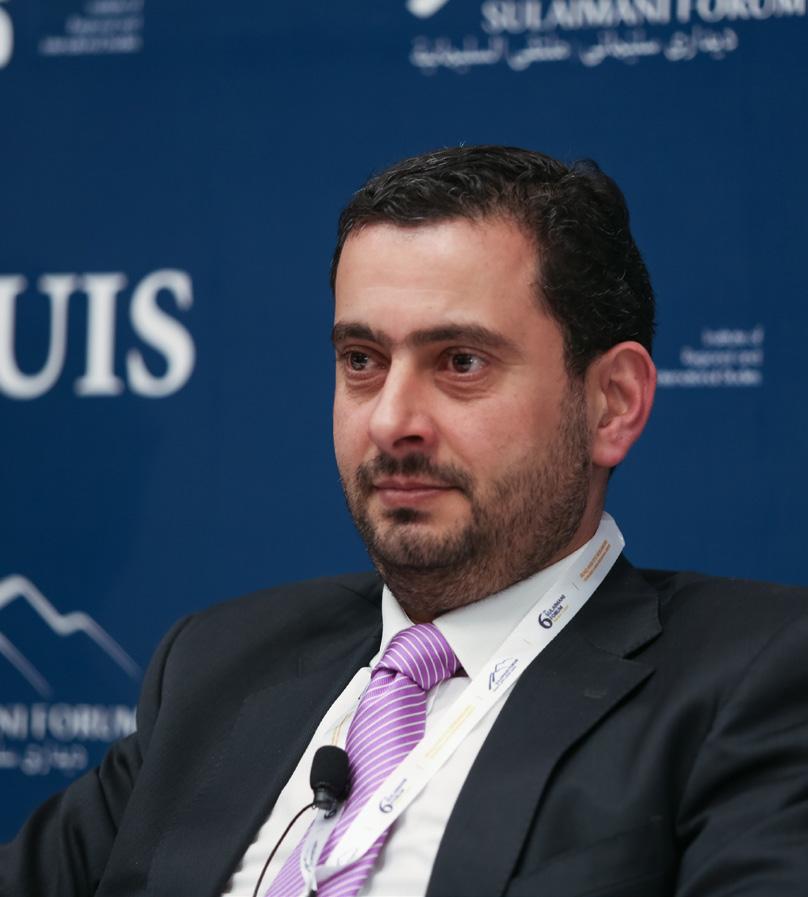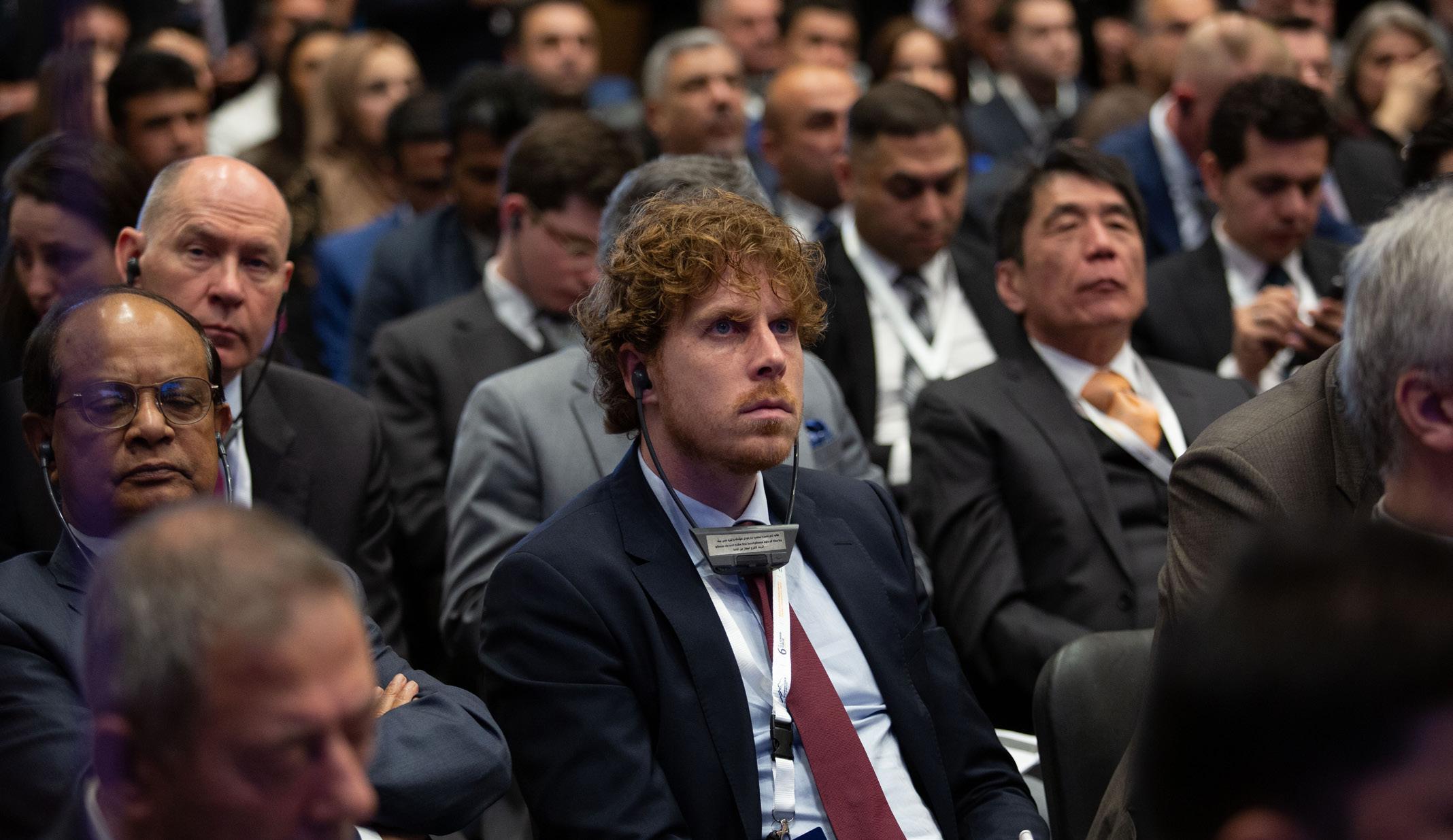
5 minute read
Regional Economic Integration: Trade, Infrastructure, and Energy
Advertisement
Speakers: Tariq Hammouri Minister of Trade, Industry, and Supply for Jordan Luay Al Khateeb Minister of Electricity for the Federal Government of Iraq Saleh Jabbouri Minister of Industry for the Federal Government of Iraq
Wonacott moderated the final panel of the first day of the 2019 Sulaimani Forum. Prior to becoming the Middle East Editor for WSJ, he served as WSJ’s Africa Bureau Chief and Dow Jones Newswires from 2010 to 2015. From 2005 to 2009, Mr. Wonacott served as the Senior Correspondent for South Asia for WSJ. He opened by emphasizing that trade integration would be at the center of the discussion. Whether in Europe, Africa, or Asia, it is widely agreed upon that trade integration can boost a nation’s growth, create jobs, and provide opportunities for youth. Yet the Middle East’s economies are less integrated than most, as they are fragmented by blockades, conflict zones, and a lack of investment. He exhorted the panel to navigate the way to offer solutions for Iraq.
Hammouri explained that the region has suffered from decades of conflict and crises, the latest of which was the devastating wave of terrorism. This has weakened and strained the regional economy, preventing development and causing regression. Such consequences were compounded by several factors and events; the Arab Spring, heavier restrictions on borders, and the war against terror, among others. In light of this, the region would struggle to make headway in terms of development and instead see rising levels of unemployment and poverty, as well as poor access to education. Such a reality would prove to be a fertile ground for indoctrination into extremist groups, leading to further instability in the region, and making it a pressing matter to be dealt with on the global stage. Therefore, networks and mechanisms should be established to ensure economic stability and opportunities that the citizens of countries most impacted by instability and violence can benefit from, as well as to promote better access to education and employment.

It is important that networks and mechanisms be established to ensure economic opportunities that citizens can benefit from, as well as ensure access to education and employment “
Al Khateeb began by stating that economic and energy development inside Iraq requires regional involvement in terms of both trade and infrastructure, as well as developing a promising Middle East market for the energy trade. Iraq’s geographical position is crucial, especially in relation to electricity, as it provides an opportunity for collaboration and business generation with neighboring countries. This goes beyond Iraq’s need to provide electricity to all citizens, and can enhance the socio-political connections that Iraq has enjoyed in the past. In both the near and distant future, he hopes that Iraq would work with its neighbors to create a competitive energy market in the Middle East, leading to economic growth and stability for all, as well as a significant political role for Iraq. Investment opportunities in Iraq are promising, as the energy sector requires a lot of investment for infrastructure support, which foreign companies can provide. Here, he clarifies that he is not referring to the production of energy but rather the equitable distribution of energy.

“Without developing the infrastructure on the transmission and distribution system, turning the whole distribution system into a smart grid, and putting an end to human intervention in managing financial aspects, it’s going to be quite impossible to resurrect this sector from the ashes. “
International actors need to present novel solutions to the country’s problems that are results-oriented, as well as flexible enough to incorporate new challenges. Nevertheless, while there are reasons for concern, Blecua argued that there are a greater number of reasons to be hopeful. Iraq could serve as a model in the region as few countries can claim to have absorbed as many violent events and destructive political dynamics, yet retain such a vibrant and democratic political framework. Iraq proves that there is hope for democratic alternatives in the Arab world.

Jabbouri argued for the need to strengthen the federal budget in Iraq, adding that trade negotiations and agreements with Jordan had already begun. There are many opportunities to pursue partnerships, such as in the oil business. However, the circumstances in which investment can legally take place are complicated and often not encouraging to investors. Despite that, he stated that Iraq was open to investment opportunities. Responding to Wonacott›s question regarding the readiness of Iraq to compete with other countries regionally, he said that Iraqi companies were not in a strong position. Local companies are competing with imported goods, and there is also a reduction in local production and a lack of consumer confidence towards local goods, though important monitoring and quality controls are in place. “ The economic interests of countries within the region need to be discussed within the framework of partnership, not within the framework of a winner-loser dynamic. “ The industry sector stands to be an integral part of the federal budget, of which it previously contributed 17 percent. However, the reality today is that the industry sector is weakened, and the federal budget does not allow for the rehabilitation of factories and companies. Against this backdrop, he urged investors from different sectors to seek partnerships and investment opportunities in Iraq. Iraq wants to establish sustainable economic partnerships with its neighbors, he added, which can contribute to stability in the region. Fostering this progress is the aim of the current administration.










